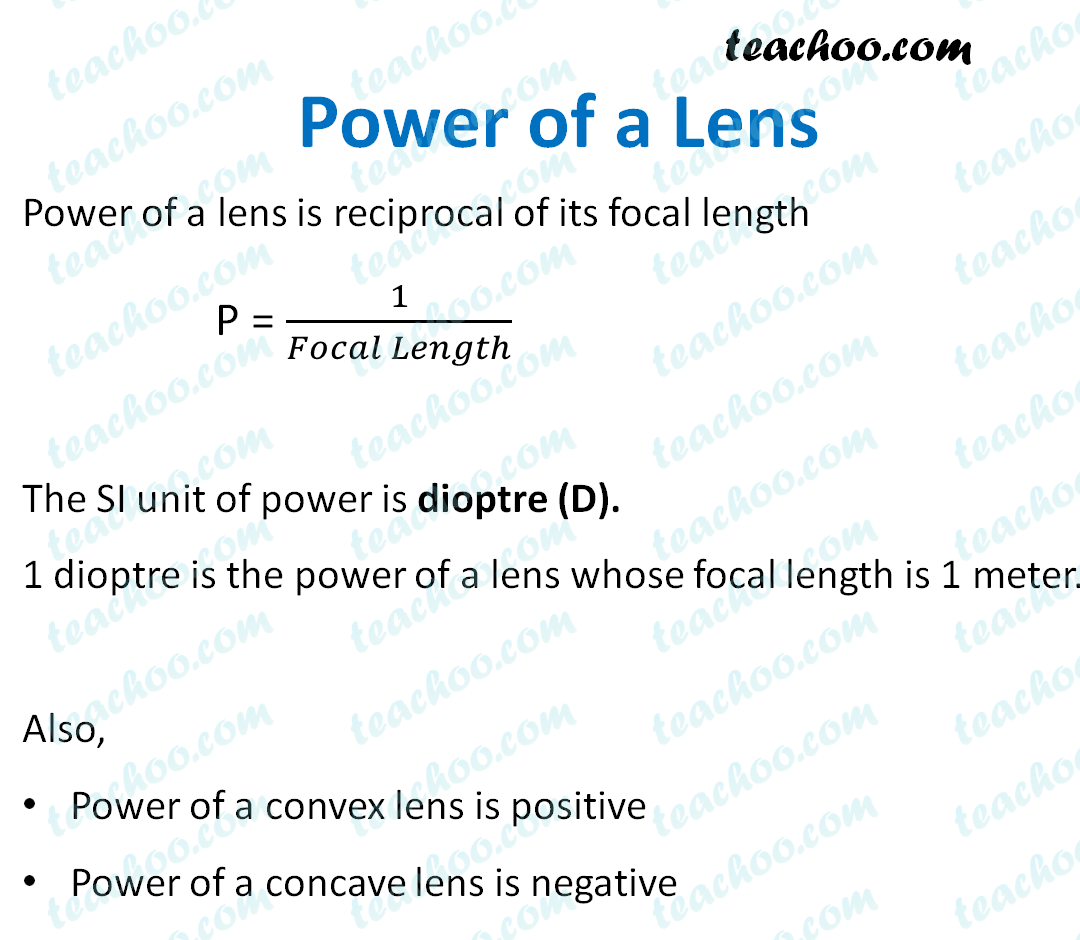The ability of a lens to reflect or bend light is known as the Power of a Lens in normal language. This reflection can be convergence or divergence. Again this reflection depends on its focal length. In different mediums, the reflection changes because convergence or divergence is highly dependable on the medium in which light travels.
The power of a lens is a degree of convergence or divergence of light rays in a particular medium. It is defined as the reciprocal of its focal length and represented by the letter P. More refraction and the ability to pass the light implies more power of the lens.
Convex lenses have better converging abilities, while concave lenses have better diverging abilities. If focal length decreases, then light bends more that’s why focal length and lens power are inversely proportional. So, short focal length leads to more optical power, and long focal length leads to less optical power.
Power of a Lens = 1 / focal length of the lens (in meters)
Or
P = 1 / f
Where P = Power of a Lens
And f = focal length of the lens in meters
A lens of a small focal length has a large power of converging or diverging a parallel light beam. As the power of a lens is inversely proportional to focal length, short focal length lenses have more power, and long focal length lenses have less power.

Unit of Power of a Lens
The SI unit of power of a lens is ‘dioptre’ and is represented by the letter D. One dioptre is the power of a lens whose focal length is 1 meter. It is written as m-1. We can measure the power of a lens using an instrument named a dioptre meter.
The power of the convex lens is positive because it has a positive focal length. At the same time, the power of the concave lens is negative because it has a negative focal length. The power of a plain glass plate is 0.
For example, if f = -0.5
P = 1 / -0.5
= -10 / 5
= -2D
So here the power of the lens is -2D.
If f = 1 meter
P = 1 / 1
= 1D
So here the power of the lens is 1D.
If f = 1 cm
P = 100 / 1
= 100D
So here the power of the lens is 100D.
So, P = 100 / f if f is in cm
And P = 1 / f if f is in m
Combined Power
Combining two lenses of different focal lengths gives the same effect as the single lens of resultant length.
1 / F = 1 / f1 1 / f2
Where F = desired focal length
And f1, f2 = different focal lengths, which we have achieved through a different lens.
Or
Power of combination of lens = power of lens 1 power of lens 2
P = P1 P2
Where P = Power of combined lens
And P1, P2 = Power of individual lens which we have added to achieve a combined effect.
We can always put the number of lenses close to combine their power and create the effect of a single higher power lens if needed. Similarly, the optical power of a single lens is approximately equivalent to the sum of the powers of each surface. This concept is highly used in optometry.
When eyes have too little refractive powers to focus light on the retina, it generates refractive errors. The myopic eyes have too much power, so light gets focused in front of the retina rather than on the retina. This is known as minus power.
Opposite to that, the hyperopic eyes have too little power, so when the eyes are relaxed, the light gets focused behind the retina instead of on the retina. This is known as positive power. Both eyes can have different refractive power as both eyes contain different lenses.
Doctors can correct these errors generated in vision due to positive or negative powers by prescribing us lenses of suitable powers that correct our vision and help us see clearly. These glasses or lenses advised by the doctor help light fall on the retina instead of in front of it or back.
Optical Power
The optical power is the degree to which the lens reflects (converge or diverge) light. We use converging lenses for positive optical power and diverging lenses for negative optical power. A Refractive medium can change its optical power and focal length.
Applications of Lens
Convex lenses are widely used in Human eyes, magnifying glasses, projectors, different types of telescopes, monoculars, binoculars, cameras, microscopes etc. concave lenses are used for correcting short-sightedness, i.e. myopia and in flashlights.
Conclusion
We hope this article helped you get used to the Power of a Lens, its unit and all other required basic information. Put this information to use and read further articles to gain a sound understanding.
Read Also